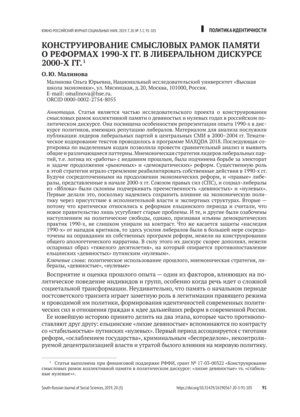Abstract
The article is part of the research project on the construction of collective memory frames about the 1990s and the 2000s in Russian political discourse. It explores the specificity of the 1990s’ reforms representation in the discourse of the reputed “liberals”. The analysis is based on the publications of the liberal parties’ leaders in federal media in 2000–2001. The thematic coding of the texts was carried out on the basis of MAXQDA 2018 (application). The subsequent assortment of the coded fragments enabled the author to reveal the common and the distinctive patterns of representation. The mnemonic strategies of the liberals, i. e. the logic they followed while “using” the recent past for political purposes, was subjected to their struggle for the “market” and “democratic” reforms. Their desire to rehabilitate their own roles in the 1990s contributed to this strategy. As they were focused on further reforms in the sphere of economy, the leaders of both “Soyuz Pravykh Sil” and “Yabloko” parties tended to emphasize the succession between the 1990s and the 2000s. The former did so because they hoped to influence the economic policy of the new president through their representatives in the government and with the help of expert organizations. The latter were critical of both Yeltsin’s and Putin’s reforms and argued that the the policy of new government aggravates old problems. Both were concerned with Putin’s attacks on democratic freedoms. Yet, aware of the defects of the 1990s democratic practices they did not emphasize the contrast between the “new authoritarianism” and the “past freedoms”. The liberals did their best to defend the legacy of the 1990s from the newly arising criticism, but while doing so they were much more concerned with the rehabilitation of their own programs of political reforms than with constructing a general apologetic narrative. As a result, their discourse contributed to, rather than challenged the image of Yeltsin’s’ 1990s and Putin’s 2000s.
Keywords
Funding information
The research was carried out through the financial support of the Russian Foundation for Basic Research, grant № 17–03–00322 (Constructing frames of collective memory in the political discourse: the “hard 1990s” vs. the “stable 2000s”).
References
Ассман, А. (2014). Длинная тень прошлого: Мемориальная культура и историческая политика. М.: Новое литературное обозрение.
Гайдар, Е. (2003, Февраль 2). Экономическая политика. Если обойтись без комплиментов. Новое время, 5, 20–22.
Гайдар, Е. (2004, Апрель 14). Либерализм: слухи о смерти преувеличены. Ведомости, 64, 5.
Гайдар, Е. (2004, Декабрь 21). Украина и Россия: что дальше? Итоги, 51, 24–28.
Гайдар, Е. (2009). В начале новой фазы. Свободная мысль, 5, 59–68.
Гайдар, Е., Чубайс, А. (2011). Развилки новейшей истории России. М.: ОГИ.
Ельцин, Б.Н. (1993, Март 23). Обращение Президента Российской Федерации Б.Н. Ельцина к гражданам России. Красная звезда, 65, 1.
Латов, Ю.В. (2018). Парадоксы восприятия современными россиянами России времен Л.И. Брежнева, Б.Н. Ельцина и В.В. Путина. Полис. Политические исследования, 5, 116–133.DOI: 10.17976/jpps/2018.05.20
Левинсон, А. (2007). 1990-е и 1990-й: Социологические материалы. Новое литературное обозрение, 2, 489–503.
Малинова, О.Ю. (2017). Конструирование «либерализма» в постсоветской России: Наследие 1990-х в идеологических битвах 2000-х. Полития, 1(84), 6–28.
Малинова, О.Ю. (2018). Обоснование политики 2000-х годов в дискурсе В.В. Путина и формирование мифа о «лихих девяностых». Политическая наука, 3, 45–69. DOI: 10.31249/poln/2018.03.03
Немцов, Б. (2000, Ноябрь 11). Государство — это мы. Московские новости, 5.
Немцов, Б. (2003, Март 15). Стратегия России. Свобода, собственность, эффективное государство. Независимая газета, 58 (2891), 1.
Немцов, Б., Кара-Мурза, В. (мл.) (2003, Май 23). Путинский курс — прорыв или тупик? Размышления после трех лет правления второго президента. Независимая газета, 100, 1.
Рыжков, В. (2004, Апрель 5). Осмысление: апрельские тезисы о либерализме. Ведомости, 57, 5.
Филатов, С. (2003, Октябрь 2) Это была смертельная схватка за власть. Россия, 40, 8.
Ходорковский, М. (2004, Март 29). Кризис либерализма в России. Ведомости, 52, 5.
Ходорковский, М. (2005, Август 1). Левый поворот. Ведомости, 139, 5.
Чубайс, А. (2003, Октябрь 1) Миссия России в XXI веке. Независимая газета, 209, 1.
Шейнис, В. (2003, Октябрь 7). Октябрь 1993-го: конец переходной эпохи. Независимая газета, 214, 11.
Явлинский, Г. (2000, Август 26) Не все сбылось так, как задумывалось. Экономика и жизнь, 34, 1.
Явлинский, Г. (2000, Ноябрь 11). Иная реформа. Возможна другая стратегия переходного периода. Независимая газета, 213(2275), 9.
Явлинский, Г. (2001, Июнь 19). Новый курс. Московские новости, 25, 10.
Явлинский, Г. (2001, Июнь 28). Либерализм для всех. Общая газета, 26, с. 7.
Явлинский, Г. (2001, Август 20). Демократия для толстых. Новая газета, 59, 1.
Явлинский, Г. (2002, Декабрь 11). «Добрый царь» как фактор риска. Московские новости, 44, 8.
Явлинский, Г. (2003, Май 13). Периферийный капитализм. Московские новости, 18, 10.
Явлинский, Г. (2005, Июнь 15) День независимости от большевизма. Известия, 4.
Davies, M. (2013). Opposition and Ideology in News Discourse. L., etc.: Bloomsbury.
Fish, S.M. (1997). The Predicament of Russian Liberalism: Evidence from the December 1995 Parliamentary Elections. Europe-Asia Studies, 49(2), 191–220.
Halbwachs, M. (1992). On Collective Memory. Chicago Il.: University of Chicago Press.
Hale, H.E. (2004). Yabloko and the Challenge of Building a Liberal Party in Russia. Europe-Asia Studies, 56(7), 993–1020.
Irwin-Zarecka, I. (1994). Frames of Remembrance. The Dynamics of Collective Memory. New Brunswick etc.: Transaction Publishers.
Müller, J.-W. (2004) Introduction: the power of memory, the memory of power and the power over memory. In J.-W. Müller (Ed.) Memory and Power in Post-War Europe. Studies in the Presence of the Past (pp. 1–35). Cambridge: Cambridge University Press.
Olick, J. (1999). Collective Memory: Two Cultures. Sociological Theory, 17(3): 333–348.
Olick, J. (2007). The Politics of Regret. On Collective Memory and Historical Responsibility. L., N.Y.: Routledge.
Vuorinen, M., Kotilainen, N. & Huhtinen, A.-M. (Eds.) (2014). Binaries in Battle: Representations of Division and Conflict. Newcastle upon Tyne: Cambridge Scholars Publishing.
Wertsch, J.V. (2002). Voices of Collective Remembering. Cambridge: Cambridge University Press.
White, D. (2007). Victims of a Managed Democracy? Explaining the Electoral Decline of the Yabloko Party. Demokratizatsiya, 15(2), 209–229.


